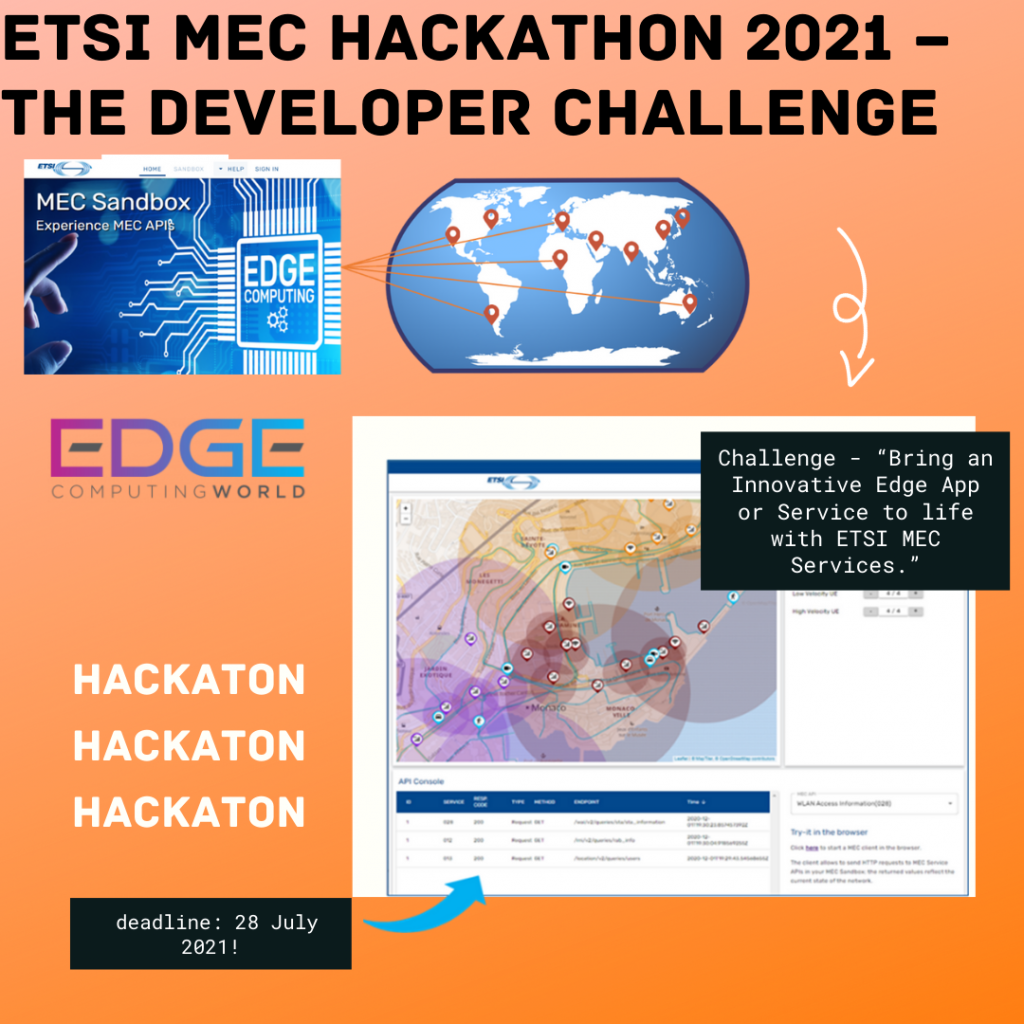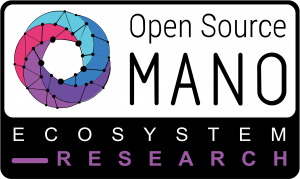Edge Computing World – MEC Hackathon 2021

UC3M and 5TONIC are one out of the sponsors of the annual Hackaton
Call for developers: Submission OPEN Final deadline is 28 July 2021!
The Hackathon will be held virtual over the summer, and Edge Computing World will be hosting the Hackathon information portal and will be the venue for final pitches and judging of the Hackathon entries during the Edge Developers Conference on October 12th.

Bring your application or service to life with the ETSI MEC Sandbox.
Enter your team for this competition today!
You will be asked to develop an Edge Application or Edge Service, using MEC Service APIs
offered by the ETSI MEC Sandbox. Your solution may include any combinations of
terminal apps, edge apps or services, or cloud components.
More info: https://www.edgecomputingworld.com/hackathon/
This year Challenge – “Bring an Innovative Edge App or Service to life with ETSI MEC Services.”:
- MEC (Multi-access Edge Computing) provides developers with localized, low-latency resources that can be utilized to create new and innovative solutions, which are essential to many vertical markets of the 5G era. ETSI’s ISG MEC[1] is standardizing an open environment that enables the integration of applications from infrastructure and edge service providers across MEC platforms and systems. The purpose of this Hackathon is to demonstrate the usage of MEC Service APIs to create an innovative Edge Application or Service[2].
- Teams will be provided with a dedicated instance of the ETSI MEC Sandbox[3] for their work over the duration of the Hackathon. The MEC Sandbox is an online environment where developers access and interact with live ETSI MEC Service APIs in an emulated edge network set in Monaco, which includes 4G, 5G, and WiFi configurations. The MEC Sandbox offers edge contextual information via the Location (MEC013), Radio Network Information (MEC012) and WLAN Access Information (MEC028) ETSI MEC Service APIs.

- Teams are encouraged to be creative in selecting an application vertical to focus for their submission. Example segments include (but are not limited to): 1) automotive; 2) AR/VR, media, and entertainment; 3) drones; 4) smart cities; 5) factories of the future; etc. For inspiration, please refer to this automotive case study example from the first MEC Hackathon or the use-cases listed in MEC 002.
- Teams at the Hackathon will be tasked to develop an innovative Edge Application or Service that utilizes the ETSI MEC Service APIs provided in the Sandbox. Challenge winning criteria will include:
- Innovation – how novel is the submitted edge app or service?
- Usage of MEC Service APIs – especially, the use of multiple service APIs and any interworking between them.
- Quality – quality of submission deliverables
- The Open Edge Compute Initiative via the Living Edge Lab at Carnegie Mellon University offers a set of edge-native building block open-source projects. Teams may (optionally) utilize these projects while taking up the hackathon challenge. To see how these can help you, visit: https://www.openedgecomputing.org/lel-applications/. Two projects that are amenable to the Hackathon challenge are:
- OpenRTiST – a platform for wearable cognitive assistance applications, to transform the live video from a mobile client into the styles of various artworks.
- OpenScout – an edge-native application designed for automated situational awareness, supporting automated object detection and facial recognition.
- Teams are not required to use a specific edge hosting platform or MEC lifecycle management APIs. Developers may use any virtualization environment of their choosing. For teams that need an edge hosting or virtualization environment, edge compute resources will be provided by POWDER (Platform for Open Wireless Data-driven Experimental Research), including bare metal, VM and container options. Information can be found here: https://docs.powderwireless.net/virtual-machines-advanced.html.
- Teams are encouraged to reuse their existing or past projects with their applications and apply/adapt them to the present challenge.
Edge Computing World – MEC Hackathon 2021 – Team submission guidelines
- Team size: 5 members (maximum)
- Submissions must be sent through the application form via the following link: Hackathon Submission Form.
- Submissions should include a description of the proposed MEC App or Service idea; anticipated use of MEC Service APIs; how the proposed submission is innovative and will benefit the MEC ecosystem; information on any intention to reuse / integrate code from past activities, or other projects / prototypes / products (highly recommended); and a short CV for each team member. Any supporting material (e.g., short video clips) related to the idea is welcome.
- IMPORTANT: Submissions should clearly state how the team intends to use ETSI MEC APIs (available in the MEC Sandbox try-mec.etsi.org).
- Submission due date: 28th July 2021
Submissions will be evaluated by the Edge Computing World – MEC Hackathon Organizing Committee based on various criteria, e.g., relevance to the Call for Developers, innovativeness of the proposed solution, usage of MEC APIs, composition of the team, level of maturity of the project.
- Selected teams will be notified by 6th August 2021. Participants selected for the competition will provided dedicated instances of the ETSI MEC Sandbox with technical support with access available from 9th August 2021.
- Any informative Hackathon “Getting Started” Webinar for Developers will be held (and recorded) on 21st July 2021. This will provide developers within details on how to access and use the MEC Sandbox for their work.
- Cost: The submission is free of charge, as well as the Hackathon attendance for the selected teams.
- Venue: Worldwide Virtual Hackathon – 9th August through 1st October 2021.
- Mid-Hackathon Check-in: Admitted teams will be encouraged to submit an optional mid-hackathon (15th September 2021) submission that may be utilized to promote the Edge Computing World event, leading into the conference.
- Final Submissions: Admitted teams will be required to finalize their Hackathon submissions by 1st October 2021.
- Winners will be selected solely at the discretion of the Hackathon jury.
- At the end of the competition, there will be an awards ceremony, in the Edge Developer Conference of the Edge Computing World (on 12th October 2021) with several prizes, courtesy of the Organizing Committee:
-
- A cash prize pool of over $10,000 will be distributed to the top submissions and presented to the winners as part of the Edge Developer Conference program.
- The venue host, Topio Networks, will provide the winners free passes for a future Edge World Compute, Edge Developer Conferences.
- Telefonica Open Innovation may offer winners a fast track to access to their startup incubator programs.
- The winner will be eligible to demonstrate their solution at the Open Edge Compute Initiative Fall Workshop that will be hosted at Carnegie Mellon University in Pittsburgh, Pennsylvania. Intel will offer the winning team an Opportunity to present their project to a global audience in a Converged Edge Meetup Platform. This means that the project will be eligible to give a technical presentation on their project within a Converged Edge Meetup with Intel managing the promotions of the event/event management/producing/recording the presentation.
- All MEC Hackathon participants will have a great opportunity for networking with the Edge Computing World conference attendants who represent key stakeholders of the industry from all corners of the world.
Organized by:






![]()


![]()

![]()
[1] For more information on the ETSI MEC standard (including MEC architecture and MEC APIs), you can check the specification tab at this URL.
[2] Refer to the ETSI white paper “Developing software for MEC”, available via this link, for information on developing using MEC service APIs.
[3] The ETSI MEC Sandbox is offered here: try-mec.etsi.org. Please refer to the Sandbox user guide (link) and the “Getting Started with the Sandbox” webinar (link).
Hits: 652


 5GROWTH is funded by the European Union’s Research and Innovation Programme Horizon 2020 under Grant Agreement no. 856709
5GROWTH is funded by the European Union’s Research and Innovation Programme Horizon 2020 under Grant Agreement no. 856709
